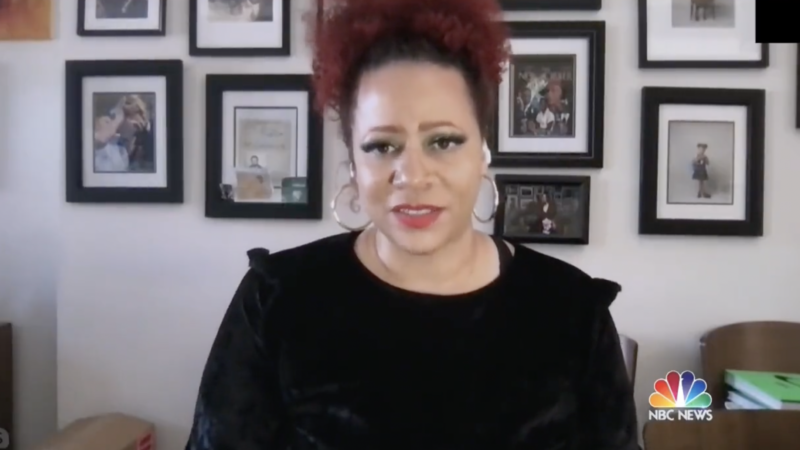Nikole Hannah-Jones Doesn't Understand 'The Idea That Parents Should Decide' What Schools Teach
The 1619 Project author thinks Terry McAuliffe had it right.

Nikole Hannah-Jones is a New York Times journalist and architect of the 1619 Project, a Pulitzer Prize–winning series of articles that recontextualizes the central roles that slavery and racism played in America's founding. Those articles are now being taught in some public schools, even though numerous critics of the project have raised questions about very basic factual issues in some of the pieces.
Perhaps it should come as no surprise, then, that Hannah-Jones is uncomfortable leaving curriculum decisions to people who are not district officials and would thus be less inclined to teach her work. In a recent interview on Meet the Press, Hannah-Jones confessed that she did not "understand this idea that parents should decide what's being taught."
Nikole Hannah-Jones: Parents shouldn't be in charge of their kids' schooling: "I don't really understand this idea that parents should decide what's being taught. I'm not a professional educator. I don't have a degree in social studies." Yet she wants the 1619 Project in schools. pic.twitter.com/UAjFTCvVmg
— Steve Guest (@SteveGuest) December 26, 2021
Her statement echoed widely panned comments made by former Virginia Gov. Terry McAuliffe, a Democrat, during the 2021 gubernatorial race against Republican challenger Glenn Youngkin. McAuliffe's statement denying that parents should play a paramount role in the education of their own children is rightly seen as a realigning moment—one that allowed Youngkin to run (and win) on a platform of making the public education system accountable to families. But Hannah-Jones seems to believe that McAuliffe had it right, even if his comments were unpopular.
During the Meet the Press interview, Hannah-Jones made an attempt at consistency, taking the position that neither she nor other non-educators have the relative expertise to decide what should be taught in schools. "I'm not a professional educator," she said. This is a somewhat confusing claim coming from someone who is currently a tenured professor at Howard University's School of Communications; she is, quite literally, a professional educator.
As it turns out, the idea that parents should broadly surrender their rights to public school officials is both unpopular and misguided. Yes, it's possible for parents to become too involved in school affairs, getting individual books removed from library shelves. But much of what parents have found objectionable in the past year is truly eyebrow-raising: As I wrote last January in "An Anti-Racist Education for Middle Schoolers":
Fairfax Public Schools in Virginia invited Ibram X. Kendi, an activist and author of the books How to Be an Antiracist and Antiracist Baby, to have a virtual conversation with principals, administrators, and teachers. Kendi, who was paid $20,000 to speak for one hour, believes that the Constitution should be amended to create a federal Department of Anti-Racism with the power to censor public officials who make racist statements. The district also bought $24,000 worth of his books, which argue that any arrangement producing unequal results along racial lines is racist by definition.
The National Education Association (NEA), for instance, wants schools to offer a critique of "empire, white supremacy, anti-Blackness, anti-Indigeneity, racism, patriarchy, cisheteropatriarchy, capitalism, ableism, anthropocentrism, and other forms of power and oppression at the intersections of our society." It doesn't matter whether you define this sort of thing as critical race theory—though the NEA certainly does—it matters that activist educators are working to include it.
The best solution to the education culture wars is to give parents the best kind of choice: school choice. Instead of engaging in venomous, all-consuming battles over what schools should teach to students, families should be empowered to take their education dollars and find a schooling option that best fits their children. "The critical race theory debate wouldn't matter if we had more school choice," noted Reason's J.D. Tuccille. "Guide your children's education and let your opponents teach their own kids."


Show Comments (213)